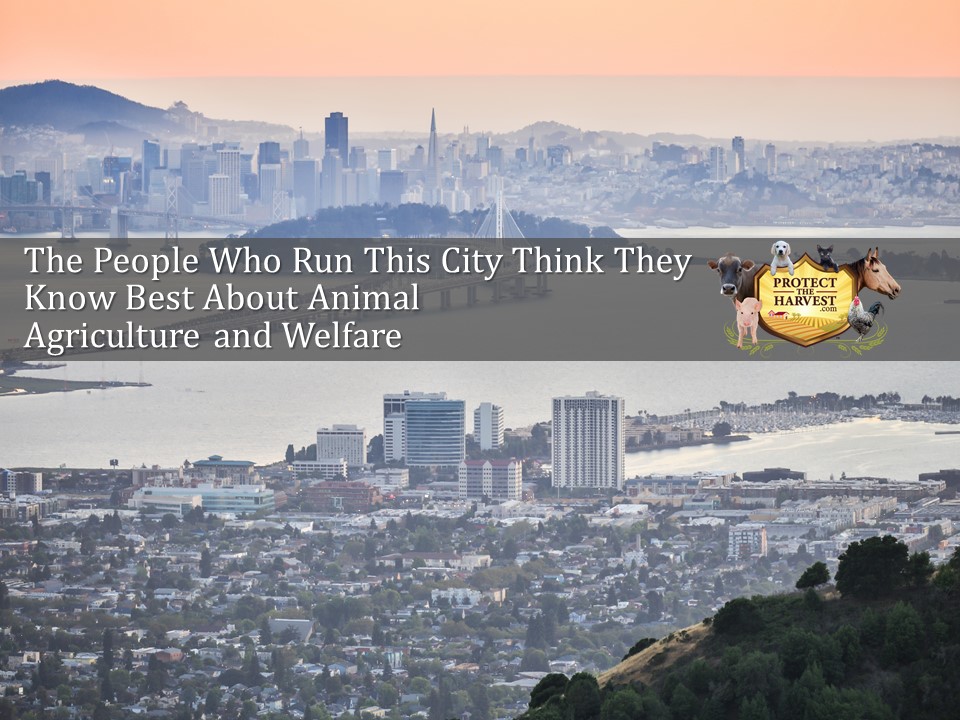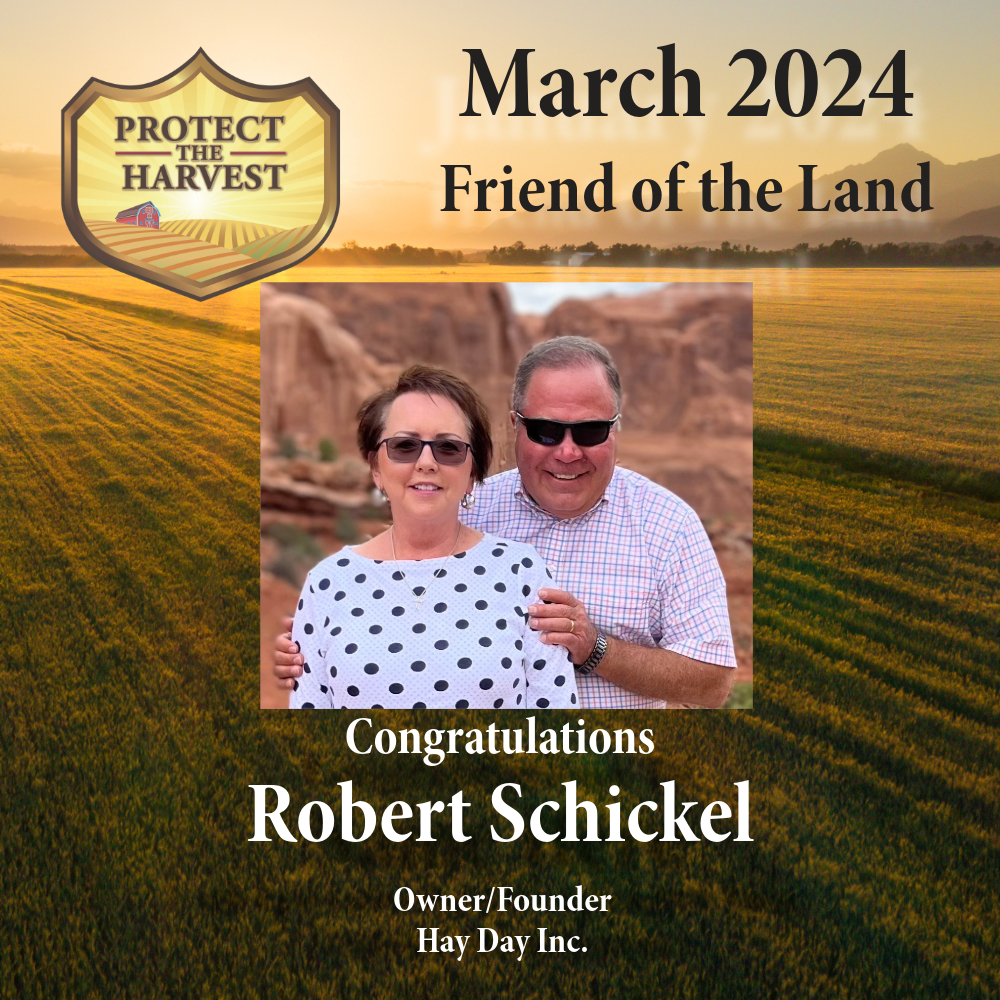
On December 10, 2019, the Berkeley City Council adopted a resolution titled “Resolution of the Council of the City of Berkeley in Support of the Non-Violent Activists Who Attempt to Expose the Conditions of Animals in Factory Farms.” This resolution was put on the City Council Agenda by the Peace and Justice Commission in support of the Animal Rights Extremist group Direct Action Everywhere, or DxE.
DxE members pride themselves on conducting “open rescues” at commercial farming operations which entail breaking and entering and removing what their members perceive as “ill” animals. Not surprisingly, they are frequently arrested and charged for the violations, but nevertheless, continue to attempt such “rescues.” DxE committed three thefts in Sonoma County, a county about one hour north of Berkeley, where they also compromised the farms biosecurity by entering wearing street shoes and DxE t-shirts over their Tyvek biosecurity coveralls.
While it is common knowledge that Berkeley is a very liberal and “progressive” city, there are several issues that are concerning in the adoption of this resolution.
Precedent Set Allowing Non-Violent Activists to Trespass and Steal Animals
Resolutions like this, regardless of where they are adopted, set a precedent that should worry any industry that uses animals. This includes agriculture, veterinary, biomedical research as well as pet owners and equestrian industries, as they are all subject to being labeled as being cruel to animals. This begs the question “Who is making the determination of what cruelty is?” Animal Rights groups have long stated their ultimate goal is to sever the human/animal bond, and that any use of animals, whether for fur, fiber, food, work, competition, or companionship is tantamount to slavery. There is no understanding of animal welfare, biosecurity, or proper husbandry with these groups. In actuality, DxE stealing these animals under the guise of “rescuing” is in itself an act of violence. Unless one has been properly trained in animal handling, there is a very real danger of injuring animals. DxE uses the animals much the way the staged “undercover” videos made by Animal Recovery Mission (ARM) and PETA do.
Possible Brown Act violations
The Ralph M. Brown Act of 1953 is a California Act that was enacted in response to public concerns over informal and undisclosed meetings being held by local elected officials. It guarantees the public’s right to attend and participate in meetings of local legislative bodies. It must allow for public comment on every agenda item and items not on the agenda and must include reasonable period of time for public comment before or during consideration. There may be a simple consensus, or a vote by roll call. Roll call votes shall be required for adoption of ordinances, adoption of resolutions, approval of agreements and actions involving the payment of money. The Brown Act also prohibits changing the wording of any item on the agenda without allowing for public comment.
In the televised meeting, Councilmember Hahn changed wording in the resolution presented by Councilmember Davila. She stated that she reworded the resolution to “appeal to the legal community and District Attorney by tying these actions to actual law.” In the Brown Act with regards to changing wording, it states “if the version presented to the full legislative body is different from the version presented to, and considered by, the committee, then the public must be given another opportunity to speak on that item at the meeting of the full body.”
Mayor Arreguin confirmed with Councilmember Davila that she agreed to the changes, then asked if there was any objection to the wording change but did not ask for public comment about the proposed changes. Instead he stated the resolution WOULD be adopted that night, without asking for a roll call vote. He then recognized all the people from DxE and repeated the resolution would be passed. A few minutes later, Councilmember Bartlett made a statement on record as being “disturbed that our constituents are facing felony charges for doing their duty to be activists in a nonviolent manner” (referring to the DxE members who were defendants). During the public comment period, only one member from DxE made a comment. It is obvious from the televised meeting that the council has a strong Animal Rights ideology.
Animal Rights Bias
It should come as no surprise that when checking into Berkeley officials’ ties to Animal Rights there are many connections to the group DxE. In April 2017, in the DxE blog, spokesman Matt Johnson stated, “I chatted last month with Berkeley Mayor Jesse Arreguin and Councilman Ben Bartlett about animal issues. Not only did they both “definitely” support a citywide ban on the sale of fur, but Bartlett went so far as to forecast a coming “ethical revolution” for animals, acknowledging Berkeley’s responsibility as the most prominent US progressive pacemaker.”
In a later edition of the blog in September 2018, DxE’s Johnson stated: “Ordinary people don’t want to support cruelty towards animals. We’re actually in contact with the Berkeley City Council. We are working with a lot of candidates… We’ll see who gets elected.”
Who Is On Berkeley’s City Council?
Mayor Jesse Arreguin was born in Fresno, grew up in San Francisco in a working-class household. The son and grandson of farmworkers, he has moved from the agriculture background of his parents into public service. He was inspired by farmworker Cesar Chavez and was the first in his family to go to college at UC Berkeley.
Mayor Arreguin is a staunch supporter of animal rights. He has been endorsed the East Bay Animal PAC. In October of 2017, he spoke with their supporters about why he fought to ban declawing of cats and dogs, about the primate guardian issue, and about the ban on animal testing.
After the city received a PETA Compassionate City Award for its ban on the sale for fur products, Arreguin stated in the Daily Cal: “We welcome more ideas of animal rights legislation…Berkeley has a history of being at the forefront in fighting for the welfare of all animals.” Arreguín also said he believes it is the job of the government to regulate the free market and ensure that activities are both ethical and promote health and safety.
Vice Mayor Sophie Hahn grew up in Berkeley, only leaving to go to Stanford University for her law degree. She is the daughter of a UC Berkeley history professor. Hahn authored Berkeley’s “Green Monday Resolution.”
This resolution declared a climate emergency and set a goal for the city to be fossil-fuel free by 2030. It was introduced by City Council members Kate Harrison, Cheryl Davila, and Sophie Hahn and passed in June
The “Green Monday Resolution” goes on to state “all City-owned and City-managed facilities and programs will provide only plant-based foods on Mondays (or another day of the week).” Although the day of the week that Berkeley is going vegan isn’t settled, the City Council’s resolution states that they will offer only vegan food at all of their meetings.
When Berkeley City Council voted to ban the sale of fur in March 2017, Councilmember Hahn successfully introduced an amendment to exempt sheepskin and lambskin, allowing leather and meat, and taking cowhide with hair, sheepskin and lambskin with fleece out of the definition of fur.
Councilmember Rashi Kesarwani was not born in California, but on the East Coast. She lived in Southern California and moved to Berkeley in 2010 to get her Masters in Public Policy.
Councilmember Susan Wengraf trained at the Bank Street School in New York and received a Masters in Special Education, taught sign language in schools, and is an award-winning documentary film maker. She is also a consultant as the visuals editor at the Emma Goldman Papers at UC Berkeley. She moved to California from New York City in 1969 and has lived in North Berkeley since then.
Councilmember Wengraf requested that the Animal Care Commission create educational materials and web content for the City of Berkeley website that informs residents of coyote behavior and suggests best ways to co-exist with coyotes without conflict. She also supported two resolutions targeting the fur industry. Fish and Game Code amendment AB 273 prohibits the trapping of fur-bearing and nongame mammals for recreational or commercial purposes, and AB 44 amends the Fish and Game Code to prohibit the sale of fur products statewide.
Councilmember Cheryl Davila was born in New York and moved to Berkeley in 1981. She was married and raised her family in West Berkeley and has lived in her district since then. She is a staunch supporter of fighting climate change and remarked on her FaceBook page that she hopes that the “charges (against DxE members) get dropped.”
Councilmember Kate Harrison supported California Assembly Bill (AB) 485, which bans the sale of purebred dogs from breeders in pet stores, requiring them to only offer shelter pets which are neutered or spayed. She also co-authored the “Green Monday” resolution that requires vegan food to be served at council meetings. She was recommended for the council by Mayor Arreguin after he won his mayoral seat and she won in a special election. Councilmember Harrison has also been endorsed by the Sierra Club.
Councilmember Rigel Robinson was born in St. Louis, MO. He moved to Berkeley and attended UC Berkeley from 2014-2018 and received a B.S. in Political Science. He had never held an elected office prior to being elected to his District 7 seat. He sponsored the “genderless” language ordinance that Berkeley adopted, changing common place words into genderless words (ie “maintenance hole” from manhole; “collegiate Greek system residences” instead of fraternities or sororities). Robinson was endorsed by the East Bay Animal PAC stating: “Animals need our voice at city hall.” He also authored the resolution supporting the anti-fur AB 273 and AB44.
Councilmember Lori Droste grew up in a small town in Ohio and started her public service career by joining her mother in various marches and later in college, where she protested the lack of racial diversity in admissions. She moved to Berkeley in 1997 and became heavily invested in social justice causes. She went to Mills College, a private liberal arts college in Oakland, CA where she received her Masters in Public Policy.
Councilmember Bill Bartlett went on record in the December 10th meeting, saying he was “disturbed that our constituents are facing felony charges for doing their duty to be activists in a non-violent manner,” referring to the DxE members facing charges for their “open rescue” efforts in another county.
DxE’s Relationship with Berkeley
The Berkeley Animal Rights Center moved into Suite C of the city-owned Telegraph Channing Mall, at 2425 Channing Way, in July 2016 at a rent of $1,620 a month. The organization describes itself on its website as “a community center organizing free speech and nonviolence trainings for animal rights and social justice advocates,” with additional functions as “a vegan store, office space, meeting location, and more!”
Ironically, another group calling itself the “Friends of DxE”, also claims the same address. In April 2017, an item on the City Council Agenda was to “Readopt the Lease Agreement: Friends of DxE for Telegraph of Channing Mall, 2425 Channing Way Suite C with minor amendments for the purposes of operating an office with supporting retail activities to include all revised amendments.” (The city had attempted to revoke the original lease because the animal rights group was doing “yoga and other team building exercises” that the city had deemed to constituted lease violations. The lease was modified to allow those activities.)
Friends of DxE, a tax-exempt organization, provides grants for the Direct Action Everywhere (DxE) network. The organization accepts fellowship applications and naturally, donations.
To read more about DxE: click HERE
Connecting the Dots
It is beyond obvious that animal rights groups have sunk their talons deeply into the very liberal city of Berkeley. Their “progressive” leanings have been apparent since the early 1960’s. With the rise of animal rights extremism, some dangerous precedents and violations of government meetings are business as usual. This resolution serves as a perfect example of the unethical cronyism that the animal rights movement relies upon so heavily to advance their cause.
While this is only a resolution in the city of Berkeley, where there are no commercial farming operations, no agriculture so to speak, it is a very slippery slope. Farm animals today, your pets tomorrow… say you have an old dog that has trouble keeping weight on, but you have it on a specialized diet and it’s getting regular veterinary care. It’s outside in your fenced yard getting some exercise and a DxE “rescuer” happens by, sees it, DECIDES it is being starved, and they steal it from your yard. These people aren’t animal welfare professionals like veterinarians, they just believe they know more than professionals do about proper animal husbandry and care.
Some City Council members made mention either in interviews, on Facebook, Twitter and even in the council meeting, that they hoped that the District Attorney of Sonoma County, a county they have absolutely NO JURISDICTION in, will either be lenient in sentencing or drop the charges completely. Although there is absolutely no legal backbone to a resolution…yet, the Council is attempting to sway the decision making in another jurisdiction through their words and actions.
Protect The Harvest will continue to keep you informed of any legislation that will affect the right to farm, raise meat animals, and own companion animals, especially in this very volatile area.



